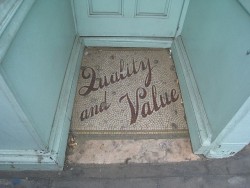Many solar companies are becoming more sophisticated in their marketing and sales, defining value and differentiating from their competitors. However, that value does not end once the sale is complete. The customer buying a solar energy system is not buying a sales process. They are buying the end result of the solar installation, whether that is lower utility bills, peace of mind, an investment product, etc.
Peter Drucker, arguably one of the foremost minds in business, asks some of the most deceptively simple questions. What does the customer want?
“What customers buy and consider valuable is never a product. It is always utility, that is, what a product or service does for them,” said Drucker.
The delivery of that value does not end once the ink dries on the contract. This is where many solar companies trip up. While installers have focused significant attention on details that grow the top line (e.g. volume of leads), the value solar companies bring to their customers is in the totality of how they deliver their product, from the sales experience all the way through the ups and downs of project delivery. Value must flow all the way through the delivery chain.
Focusing on service and streamlining delivery to provide excellent customer experience will also empower small installers to get out of the race to the bottom on pricing that has captivated the solar industry. While lowering soft costs is crucial, it shouldn’t come at any cost. Field labor should still have a safe working environment, designers should still create code compliant systems, and friendly and knowledgeable staff should support customers.
In a September article on SolarEnergy.net, noted solar market researcher Paula Mints of SPV Market Research weighed in on the cost/value discussion: “When you push the cost of things down to the lowest common denominator, when you constrain margins to the degree we have done in this industry, essentially you force companies to consider cutting corners just so they can get these systems up on the roof, or in the ground. That is really dangerous. Focusing on quality installation, which the companies I survey are all focused on quality, should be number one. It should be about getting a quality system that actually works with the consumer’s economic and long-term goals.”
Unfortunately, streamlining and improvement of project delivery has not been much of a focus in the industry yet, except amongst some of the wisest small installers. However, as a trade-based business, the lowest cost and most reliable leads will result from happy customers who tell their friends, regardless of whether or not their solar company has infrastructure to throw an open house party, offer a referral program, or can even put out a lawn sign in the front yard.
Jim Jenal is a visible and vocal small installer running a very successful business, Run on Sun, out of Pasadena, California since 2006. In a recent interview, Jenal shared his thoughts on how small installers can succeed and thrive in the competitive solar marketplace.
First and foremost, Jenal highlighted his focus on clients rather than customers. The differentiation was crucial in terms of defining customer experience. Jenal described how a “customer engages a business in a transaction—the exchange is made and they go on their way—but a client engages a business in a relationship, built on trust and understanding, that is intended to last for a long time. Much of everything else flows from that—being honest and complete in our communications, saying no when that is the right answer, etc. From a company culture perspective, having that client focus at your core builds relationships that lead to referrals and repeat business.”
Jenal ensures that the value and quality customers sign up for up front is carried throughout the entire process, even when he cannot be onsite for a project. From his foreperson Velvet Dallesandro all the way across the company, Jenal emphasized they “train [their] people to take the time to do it right—which means attention to detail in everything we do at a job site. So whether I’m there or not, our crews have been trained—and buy into—that same value.”
According to Jenal, “the key to a great client experience is communication that keeps them in the loop, and execution behind the scenes on the things only we can do.”
Small installers can focus on differentiation and control of the message to really shine. To this, Jenal commented, “you start by putting yourself out there as a local entity, and always keeping in mind that you will live or die on referrals and client opinions about the quality of your work. All of your advertising (website, Facebook, Twitter, print) must emphasize your local nature as that is a key differentiator for many potential clients. Since you are smaller, you have greater control over your message, and it is easier to guarantee that your sales staff and install teams are on board with the company’s culture vis-à-vis clients.”
Though it may seem counterintuitive, Jenal recommended walking away from jobs on a marginal site and prospective clients that are not a good match. “People respect candor…as a local company we get more traction (long term) by serving our client’s interests—even when they don’t coincide with our short-term desires.”
Jenal’s best advice for small installers?
- Have a decent web presence
- Invest in social media
- Be careful how you use your advertising dollars
- Track your results
- Encourage referrals
For further reading on the value pricing strategy and philosophy, check out “Implementing Value Pricing” by Ronald J. Baker.
—-
Photo: “Quality and Value” by wetwebwork is licensed under CC BY 2.0

